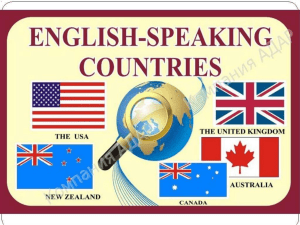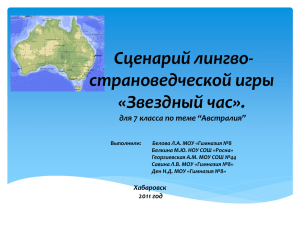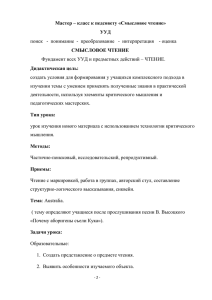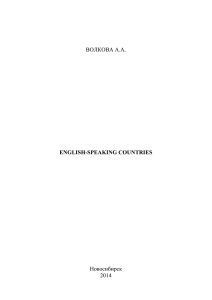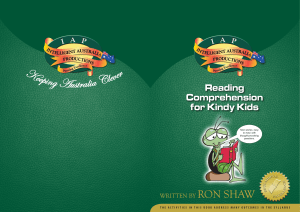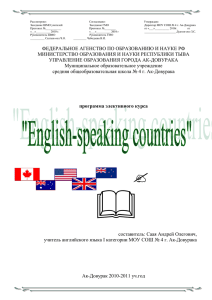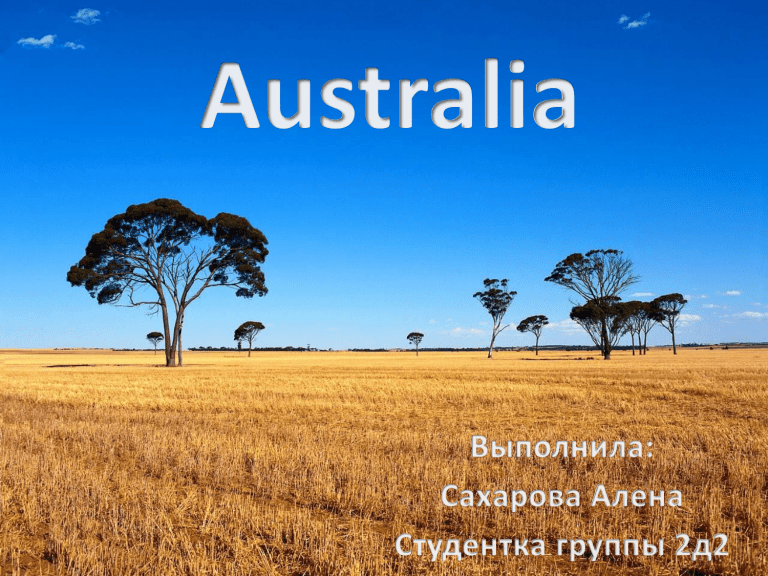
• Official language: English • Capital: Canberra • Form of government: Constitutional monarchy • Queen: Elizabeth II • Area: 7,692,024 km² (6th in the world) • Population: 22,886,545 • Currency: Australian dollar (AUD) Australia is a country in the Southern Hemisphere. Located on mainland Australia, Tasmania and several other islands in the Indian and Pacific Oceans. The sixth largest state in the world, the only state that occupies an entire mainland. Geography of Australia • The name of the mainland comes from the Latin word australis "southern". • It is the smallest continent in the world. Almost in the middle, the mainland is crossed by the southern tropic. Therefore, the main part of the mainland is located in a hot thermal zone. • The southern shores of Australia are washed by the Great Australian Bight. • Off the south coast is the largest island of the mainland Tasmania. • Australia is washed by the warm waters of the Indian and Pacific oceans with high surface temperatures (+24°C in summer, about +20°C in winter). These temperature conditions favor the growth of corals. That is why the Great Barrier Reef stretches along the northeastern coast of the mainland for more than 2 thousand km. Relief of Australia • • • • Most of the country's territory is occupied by vast deserts and lowlands. Notable Deserts: Great Sandy Desert, Great Victoria Desert. In the east of the mainland there are heavily destroyed, low mountains - the Great Dividing Range (with a maximum height of 2228 m). The tops of the mountains are dome-shaped. The eastern slopes of the mountains drop steeply to the sea, the western slopes are more gentle. Australia is the only continent where there are no active volcanoes and modern glaciation. • • • • • Australia is the driest continent on the planet. Only 1/3 of its territory receives sufficient or excessive moisture. Mainland Australia is located in three climatic zones: subequatorial, tropical and subtropical. The northern part of the mainland is located in the subequatorial zone. In the tropical belt in Australia, two types of climate are formed: tropical wet - in the east and tropical dry - in the west. Three types of climate are distinguished in the subtropical belt: subtropical humid - in the southeast, subtropical continental - north of the coast of the Great Australian Gulf, subtropical Mediterranean - in the southwest of the belt. These types of climate differ mainly in the annual amount of precipitation and their regime. Australian population • Basically, the country is inhabited by Europeans (most of them are British and Irish - 95%), Asians make up 4%, Aborigines - 1%. Flora and fauna of Australia • Of the approximately 12,000 species of plants and animals in Australia, about 9,000 are endemic. • Since the climate of most of Australia is sharply arid, dry-loving plants predominate in its flora. In the tropical forests of the northern part, giant eucalyptus, ficus, palm trees grow, and bamboo thickets are found. The southern zone of the Saanna is characterized by dense grass cover and clustered eucalyptus and umbrella acacias. The eastern part of Australia is covered with subtropical evergreen forests with a large number of eucalyptus trees, tree-like horsetails, ferns 10-20 meters high. Animal world of Australia • The most famous representatives of the Australian fauna are monotremes (platypuses and echidnas), various marsupials (koalas, kangaroos, wombats), and birds such as emu, cockatoo and kookaburra. Australia is home to the largest number of venomous snakes in the world. Australian cities • The majority of Australians live in cities and towns - 85%, or almost 16 million people. Most of them (more than 12 million) are residents of 5 metropolitan areas with a population of more than a million people: Sydney, Melbourne, Brisbane, Perth and Adelaide. • Another 14 cities have a population of over 100,000 people. Most of them are concentrated in the coastal zone of the southeast of the continent. Canberra is the capital of Australia • Canberra is the capital of Australia (Union of Australia), the administrative, scientific and cultural center of the state. • The population is over 345 thousand people. • The area of the capital is 805.6 km2. • Canberra is currently one of the most beautiful modern capitals in the world Sydney • Sydney is Australia's largest city. The area is 12 thousand km². • Population - 4.50 million (2009). • Sydney is the capital of the state of New South Wales. • The city was founded in 1788 by Arthur Phillip, who arrived here at the head of the First Fleet, and was the site of the first colonial European settlement in Australia. • The city was named by the colonists in honor of Lord Sydney, who at that time was the Minister of the British Colonies. Melbourne • Melbourne is the second largest city in Australia, the capital of the state of Victoria, located around Port Phillip Bay. Melbourne was founded in 1835. • Suburban population - about 3.8 million (2007). • The city is considered one of the main commercial, industrial and cultural centers of Australia. Melbourne is also often referred to as the country's "sports and cultural capital".
